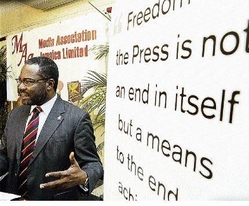
Jeff Cumberbatch, attorney-at-law and consultant at the University of the West Indies, Cave Hill campus, Barbados, speaks to members of the Media Association Jamaica Limited during the association's breakfast seminar at Terra Nova All-Suite Hotel in St Andrew yesterday. - Rudolph Brown/Photographer
ONE OF the Caribbean's leading legal academics yesterday hailed the report of the Justice Hugh Small committee as providing the "skeleton of a modern defamation law", but suggested that new legislation should include mechanisms for the "speedy, cheap and effective" resolution of disputes and the elimination of "gagging writs".
"In such an environment as we have now, the gagging writ will thrive, and the mere threat of a defamation action, no matter its merits, will suffice to keep the media in line," lamented Jeffrey Cumber-batch, an attorney who also teaches law at the Cave Hill, Barbados, campus of the University of the West Indies (UWI).
"Consideration should perhaps be given to the summary disposal of a defamation suit against a media house if a claim that publication in the public interest was made," Cumberbatch told media executives, journalists and lawyers during a forum at the Terra Nova All-Suite Hotel in St Andrew. "Once this issue is resolved, there should be prompt resolution of whether the publication was protected."
At the same time, Cumberbatch stressed that "the critical task of any attempt at legislative reforms of defamation laws, in my view, should reflect a reduction in the tension in favour of freer expression in the public interest while not losing sight of the fact that an entity's reputation is a significant asset".
Cumberbatch's observations were in the context of a review of a raft of recommendations for the overhaul of Jamaica's libel and slander laws, prepared by a committee headed by Small, that are now the subject of hearings by a parliamentary committee.
In analysing the 13 broad recommendations, Cumberbatch labelled them as either broadly cosmetic, largely essential to modernising the laws, far reaching or radical.
Those recommendations labelled as the latter cover issues such as the proposal for the abolition of criminal libel, protection for the media for the unwitting and contemporaneous republication information for credible contracted sources, the so-called wire-service defence, and the capping of economic damages in defamation cases
"While I am not aware of the incidence of prosecutions for criminal libel in Jamaica, I am of the opinion that the existence of this offence can have a chilling effect on freedom of expression and I agree with the committee's recommendation to abolish it," he said.
Cumberbatch also supported the concept of the wire-service defence, although he proposed a reformatting of the Small proposal.
"In effect, it would equate to an innocent dissemination by the media house," he said. "In such an event, the media house must not add to, or subtract anything from the news item in such a way as to make it defamatory in a way that it was not originally. This defence may also be treated under the exculpatory rubric."
On the issue of capping of economic damages, Cumberbatch argued that it was "open to question whether, in any but the most egregious cases, a large award of damages for defamation may be considered necessary and reasonably justifiable in a democratic society".
The UWI lecturer also backed the proposal of placing a one-year limitation for bringing defamation cases, saying that "in the Information Age, with the large mass of material to be absorbed on a daily basis, the idea that "right-thinking members of society" are likely to read published material many months after it is first published seems unlikely".
Significantly, however, Cumberbatch supported the Small committee's exclusion from their report a proposal similar to what obtains in the United States that makes it difficult for "public figures" to sue and prevail for libel unless they can expressly prove malice.
But whereas Small's team based its decision primarily on an argument that such a move would be discriminatory against one class of persons and therefore unconstitutional, Cumberbatch felt that much of the protection enjoyed by the United States media because of the Sullivan v The New York Times ruling could be achieved by the advancement of the common law in a series of cases that has gone before the Privy Council.
"I am of the view that the adoption of this defence achieves nothing that could not be effectively attained by a judicious application or enactment of the emerging common-law concept of 'responsible journalism', familiarly known as 'the Reynolds privilege'," he said.